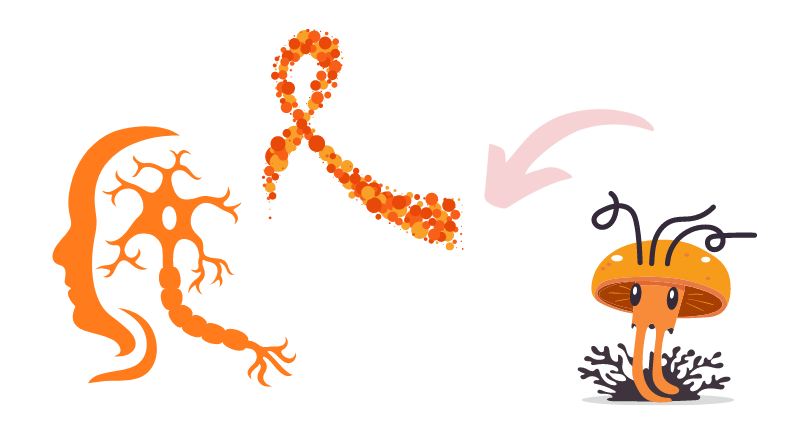The world of holistic health and wellness is full of various natural remedies, many of which come from the most unexpected sources. Among these, Cordyceps, a type of medicinal mushroom, has gained significant attention. Particularly, its potential interaction with our body’s primary stress hormone, Cortisol, has sparked interest among health enthusiasts and professionals alike.
In this comprehensive article, we aim to delve deep into the intricate relationship between Cordyceps and Cortisol, backed by relevant scientific evidence.
UNDERSTANDING THE ESSENCE OF CORDYCEPS
Originating from the high-altitude regions of China, Cordyceps is a genus of fungi with over 400 distinct species. Traditionally used in Tibetan and Chinese medicine, it has earned its reputation as a natural adaptogen — a substance that helps the body cope with stress. Before we delve into the possible interaction between Cordyceps and Cortisol, let’s get familiar with the unique characteristics of this medicinal mushroom.
Composition and Health Benefits
Cordyceps contains various bioactive compounds that contribute to its health benefits. These include:
- Cordycepin: This nucleoside analogue is noted for its potential anti-inflammatory, antioxidant, and anti-tumor properties.
- Polysaccharides: These are complex carbohydrates that can support immune function and potentially demonstrate anti-cancer effects.
- Sterols: These compounds may have cholesterol-lowering properties.
Aside from these, Cordyceps is also rich in vitamins, essential amino acids, and minerals, furthering its health-promoting capabilities.
CORTISOL: THE STRESS HORMONE
Cortisol, known as the “stress hormone,” plays a crucial role in various physiological processes. It helps maintain blood glucose levels, regulate metabolism, reduce inflammation, and assist with memory formulation[^6^]. However, persistently high levels of cortisol due to chronic stress can lead to several health issues, including anxiety, depression, heart disease, and weight gain[^7^].
The Role of Cortisol in the Body
The body’s cortisol levels fluctuate throughout the day, peaking in the morning and slowly declining towards the evening. This hormone’s role is most apparent during instances of high stress. During these periods, cortisol helps prepare the body for a ‘fight or flight’ response by making more glucose available for energy. However, if the body remains in a stressed state for prolonged periods, it can result in chronically elevated cortisol levels, leading to various negative health effects[^8^].
THE INTERPLAY BETWEEN CORDYCEPS AND CORTISOL
The primary point of interaction between Cordyceps and cortisol lies in the adaptogenic properties of Cordyceps. As an adaptogen, Cordyceps may help the body resist different kinds of stress, potentially affecting cortisol production.
Cordyceps as an Adaptogen
Adaptogens like Cordyceps have a unique ability to bring the body back to homeostasis or balance. They can increase the body’s resistance to stress by gently influencing the production and regulation of hormones, like cortisol[^9^]. Thus, Cordyceps might help moderate the body’s stress response and prevent the harmful effects of chronic cortisol exposure.
SCIENTIFIC EVIDENCE LINKING CORDYCEPS AND CORTISOL
While the research on Cordyceps and its potential effects on cortisol is limited, some studies suggest possible stress-regulating benefits.
A Groundbreaking Study
One study demonstrated the ability of Cordyceps to suppress increased cortisol levels in mice exposed to chronic unpredictable mild stress[^10^]. Although further research is required, particularly in human subjects, these findings provide preliminary evidence of the potential benefits of Cordyceps in managing stress and cortisol levels.
Future Research Prospects
Given the promising results from preliminary research, further studies are required to solidify our understanding of the relationship between Cordyceps and cortisol. Future research should aim to understand the precise mechanisms involved and evaluate the safety and efficacy of Cordyceps as a natural remedy for stress management.
IMPLICATIONS FOR STRESS MANAGEMENT AND OVERALL HEALTH
The potential interaction between Cordyceps and cortisol suggests exciting prospects for stress management and overall health.
Managing Stress Naturally
With its adaptogenic properties, Cordyceps could offer a natural solution to manage stress and mitigate its adverse health effects. By potentially moderating cortisol production, it could help individuals lead a balanced and healthy life.
Beyond Stress Management
Apart from stress management, the health benefits of Cordyceps span multiple areas. From enhancing immune function to potential anti-cancer effects, Cordyceps might serve as a versatile addition to one’s wellness routine.
CONCLUSION
The intriguing relationship between Cordyceps and Cortisol offers a promising perspective in the field of natural health solutions. With the potential ability to moderate cortisol levels, Cordyceps, as an adaptogen, could help manage stress, a prevalent issue in modern society. Although more research is warranted, current evidence points towards the potential of Cordyceps in managing cortisol levels, contributing to better stress management and overall health and wellbeing.
From managing stress naturally to providing numerous health benefits across various dimensions, Cordyceps stands as a promising natural solution. As we continue to unravel and understand this complex interplay, we come closer to harnessing the full power of nature in promoting human health and wellbeing. With the continuous advancements in scientific research, there is hope that more light will be shed on the role of Cordyceps and its impact on cortisol levels, eventually leading to more concrete and effective health solutions.
REFERENCES
- Sung, G.-H. et al. (2007). Phylogenetic classification of Cordyceps and the clavicipitaceous fungi. Studies in Mycology. Link
- Panossian, A., & Wikman, G. (2010). Effects of Adaptogens on the Central Nervous System and the Molecular Mechanisms Associated with Their Stress—Protective Activity. Pharmaceuticals (Basel, Switzerland), 3(1), 188–224. Link
- Tuli, H. S., Sharma, A. K., Sandhu, S. S., & Kashyap, D. (2013). Cordycepin: a bioactive metabolite with therapeutic potential. Life sciences, 93(23), 863–869. Link
- Wasser, S. P. (2002). Medicinal mushrooms as a source of antitumor and immunomodulating polysaccharides. Applied Microbiology and Biotechnology, 60, 258–274. Link
- Mayo Clinic. (2020). Chronic stress puts your health at risk. Link
- Harvard Health Publishing. (2020). Understanding the stress response. Link
- McEwen, B. S. (2008). Central effects of stress hormones in health and disease: Understanding the protective and damaging effects of stress and stress mediators. European Journal of Pharmacology, 583(2-3), 174–185. Link
- Panossian, A., & Wikman, G. (2009). Evidence-based efficacy of adaptogens in fatigue, and molecular mechanisms related to their stress-protective activity. Current clinical pharmacology, 4(3), 198–219. Link
- Li, S. P., Li, P., Lai, C. M., Gong, Y. X., Kan, K. K., Dong, T. T., Tsim, K. W., & Wang, Y. T. (2004). Simultaneous determination of ergosterol, nucleosides and their bases from natural and cultured Cordyceps by pressurised liquid extraction and high-performance liquid chromatography. Journal of Chromatography A, 1036(2), 239-243. Link
- Li, X., Liu, Q., Li, W., Li, Q., Qiang, O., Luo, H., Dong, J., & Zhang, Y. (2016). The Antidepressant-Like Effects of Cordycepin in a Mouse Model of Chronic Unpredictable Mild Stress. Journal of pharmacological sciences, 132(4), 252–259. Link














